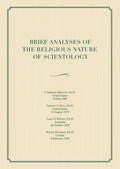IRVING HEXHAM, PH.D.
Dr. Hexham wrote in 1978:
I have been asked my professional opinion on the status of Scientology as a religion. I have studied materials of the church, spoken with members of the church and read books about Scientology. As a result of this work, I am now in a position to comment on the status of Scientology as a religion.
I ought perhaps to say something about myself to enable anyone who may read this to judge the validity of my conclusions.
I am an evangelical Christian and obtained my undergraduate degree in Religious Studies from the University of Lancaster where I studied with Professor Ninian Smart. Following this I did research in the history of religions at the University of Bristol with the Rev. F. B. Welbourn. As a graduate student I concentrated my work on the interaction between religion and society, studying for my M.A. on new religious movements in Britain and for my doctorate the relationship between Calvanism and Afrikaner nationalism in South Africa. Since completing graduate work, I have maintained an interest in religion in Southern Africa and in new religious movements in Western society. At present I hold the post of Assistant Professor of the Philosophy of Religion at Regent College in Vancouver. Regent College is a post-graduate theological school firmly committed to the Christian religion.
One of the main problems in discussing the religious nature of any movement is the question of the definition of religion. Although scholars offer many different definitions of religion they can, very broadly, be divided into two main types. There are those definitions which define religion in terms of a cultic organization and there are those definitions which define religion in terms of a way of life. To assess the religious nature of Scientology I began by using the definition given by Professor Ninian Smart, who is one of the world's leading authorities in the fields of religious studies. This definition was given at a colloquium at the University of Lancaster in December 1969 and is to be found in Professor Smart's paper entitled “Meaning in and the Meaning of Religion.” At the end of section one of his paper, paragraph reference 2.60, Professor Smart gives the following definition:
A set of institutionalized rituals identified with a tradition and expressing and/or evoking sacral sentiments directed at a divine or transdivine focus seen in the context of the human phenomenological environment and at least partially described by myths or by myths and doctrines.
It also seems clear to me that Scientology can be classified as a religion in terms of definitions which would see religion as a total way of life.
On the basis of this definition and what I have learned about Scientology it seems clear that both the teaching and practice of the Church of Scientology in British Columbia qualify Scientology to be defined as a religion. It also seems clear to me that Scientology can be classified as a religion in terms of definitions which would see religion as a total way of life. In this regard I would refer you to another colloquium paper delivered at the University of Lancaster in 1969 by the Rev. F.B. Welbourn. The title of this paper is “Towards Eliminating the Concept of Religion.” In this paper the Rev. Welbourn argues very strongly for an understanding of religion as a total way of life and not simply as a cultic activity. In terms of his definition there would be no difficulty whatsoever in recognizing Scientology as a religion.
In conclusion I would like to add that my position on the religious nature of Scientology is similar to that of Dr. Roy Wallis. Like myself, he believes Scientology to be a genuine expression of religious faith. But like myself, he would be critical of particular beliefs and practices of the Church of Scientology. This statement may be qualified by the fact that I would also be critical of many other religious movements.
Irving Hexham
Feb. 6, 1978
When he wrote this paper, Dr. Hexham was Assistant Professor of Philosophy of Religion, Regent College, Vancouver; B.C., Canada.





























